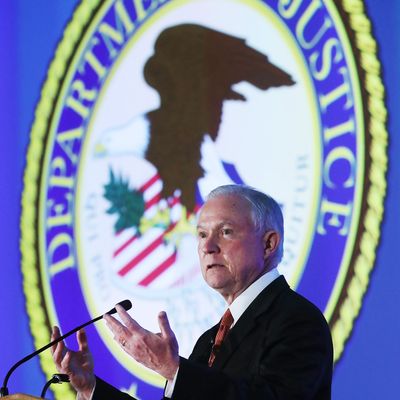
As you may recall, in March, Attorney General Jeff Sessions, having suddenly remembered he had some meetings with the Russian ambassador to the United States that he had earlier denied, recused himself from involvement in “any existing or future investigations of any matter relating in any way to the campaigns for president of the United States.”
So to those who have concluded that the Comey firing was at least partly about angst over his investigation of the Trump-Russia campaign, Sessions’s involvement in said firing would seem to violate his recusal pledge. And as Jennifer Rubin points out, that is an act with consequences:
Refusing to recuse oneself from a conflict or breaking the promise to recuse from a conflict is a serious breach of legal ethics. “Someone could file a bar complaint, and/or one with DOJ’s office of professional responsibility, if Sessions had a conflict of interest when it came to the firing decision, and if he did not follow the ethics rules, including those of DOJ by acting when he had a conflict of interest,” legal ethics expert Norman Eisen tells me. “The fact that he broke his recusal commitment, if he did, would be relevant context, and violating an agreement can sometimes in itself be an ethics violation.” In sum, Sessions has risked his law license, whether he realized it or not. He needs to testify immediately under oath; if there is no satisfactory explanation, he must resign. The alternative could be impeachment proceedings.
Democrats on Capitol Hill have been raising alarms about the issue, with Senator Ron Wyden calling on Sessions to resign over the breach of the recusal pledge.
The immediate counter from Team Trump, of course, is that Sessions’s letter recommending Comey’s firing didn’t mention or even allude to the Russian investigation. So whatever was in Trump’s mind, it wasn’t necessarily in Sessions’s mind, so he should be in the clear, right?
No so fast, say Susan Hennessey and Quinta Jurecic at Lawfare Blog:
[E]ven if we accept the White House’s stated rationale that the Director was fired because of his controversial conduct surrounding the Clinton email investigation, this might still fall within the scope of Sessions’ expansive pledge to recuse himself from “any existing or future investigations of any matters related in any way to the campaigns for President of the United States.”
The Clinton email saga was about “matters related in any way to the campaigns for President of the United States,” if anything on earth is so related. And though Sessions doesn’t specifically mention it in his letter recommending Comey’s firing, it is the entire basis for Rod Rosenstein’s evaluation of Comey’s performance, which Sessions says he relied on in deciding Comey should hit the bricks. So Sessions clearly waded into a high-profile dispute of a sort that he promised to avoid, even if it wasn’t about Russians.
Hennessey and Jurecic suggest this isn’t an “open and shut case” because it’s always possible Sessions was relying on issues beyond either the Clinton email or the Trump-Russia investigations in deciding to recommend Comey’s firing on general grounds stemming from the attorney general’s supervision of the FBI. But he sure doesn’t go out of his way to mention any.
In any event, the possibility that Sessions broke his vow in his haste to help his boss get rid of this troublesome subordinate is worth further inquiry. And maybe the attorney general should get himself some high-life legal representation, since aside from the risk of disbarment, he shares the president’s vulnerability to a charge of obstruction of justice, if it turns out the whole thing was an effort to stop investigations into suspicions about collusion between Team Trump and Team Putin.






























